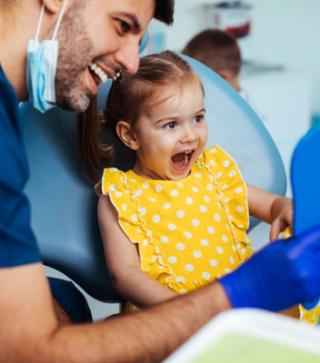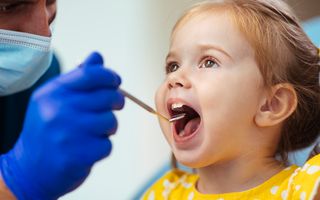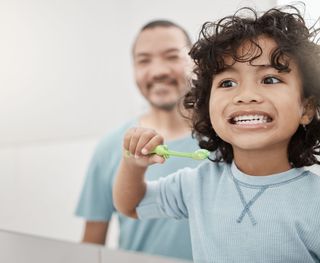
Setting up children with healthy oral hygiene habits and ensuring they go to regular dental check-ups throughout their childhood is key to ongoing good oral health in the future.
While that’s often easier said than done, our dentists at National Dental Care Browns Plains know the challenges many parents face when it comes to getting their young ones to brush and floss, and to even come to appointments. That’s why we’re here to help you help your kids, with kindness, patience, and friendly faces that can help explain what’s going on in a way they can understand.
Ultimately, it’s all about ensuring kids’ dental health, and setting them up for life.
What is kids dental?
Paediatric dentistry, or children’s dentistry, is the services and treatments given to those under the age of 18 for their oral health needs.
By the time your child reaches 2 years of age, you must make an appointment for their first visit with a dentist. There may be some rare circumstances that would warrant a visit to a dental provider before this age, but for most children, this is the age when their official dental care begins.
On their first visit to the National Dental Care Browns Plains practice, this will be an opportunity for your child to become acquainted with the dental chair, environment, staff, and their dentist. Our friendly dentist will perform a visual examination of your child's teeth, as well as address any concerns or identify any possible future issues. You and your child will also have the opportunity to ask any questions, and the dental staff will instruct you both on proper dental hygiene at home.
From there, your child will receive standard dental care as they grow. This includes all of the usual treatments and services you would expect as an adult, including:
- Preventive care
- Routine dental cleaning
- Oral examinations
- Dental x-rays
- Fillings
- Orthodontics (plates or braces)
- Extractions
In addition to annual check-ups, it’s important to follow recommendations regarding treatments or procedures for dental issues.
How does kids dental work?
As children grow, their baby teeth will slowly fall out and be replaced by adult teeth. This means there is a lot more change and development than in adult teeth, which is why children need regular check-ups to ensure everything is developing as it should and to treat or avoid problems before they arise.
Common issues with children’s oral health are:
- Tooth decay
- Cavities
- Damage to teeth as a result of accidents
- Thumb sucking/pacifier sucking
- Bad breath
- Gum disease
- Tooth grinding
Young children under the age of five will likely only need visual check-ups and basic cleanings. After the age of five, your dentist will likely suggest moving to x-ray check-ups to keep a better eye on teeth developing under the gum line.
During this time, your National Dental Care Browns Plains dentist will also work with you to encourage good dental hygiene habits at home, including tips and tricks to get your little ones to brush and floss.

Advantages of children’s dentistry
Looking after our children’s health is vital, and their oral health is a big part of that. Here are a few key advantages of paediatric dentistry:
- Maintain good oral health during childhood: Dental pain can be rough, especially for young kids, which is why avoiding issues with regular check-ups and good dental hygiene habits is a good way to ensure great oral health during childhood.
- Set up good habits for life: Taking your child to regular dental visits and teaching them the importance of dental hygiene will help to set them up with good habits and dental health for life.
- Avoid dental problems as an adult: Poor dental health as a child can lead to issues with teeth and gums throughout life, leading to discomfort and expensive treatments during adulthood. Preventative children’s dentistry and a solid, healthy foundation can help to avoid these problems down the track.
- Avoid dental fear: By starting dental visits early, you may be able to avoid the fear that some children (and plenty of adults) have of dentists and dentistry.
How much does kids dental cost?
The cost of a standard children’s check-up will vary in price just as adult treatments do. If you go to a specialist paediatric dentist rather than a standard dentist who offers children’s dentistry, you may be charged extra.
For children who are eligible for Medicare, and receive at least one additional benefit, they may be eligible for CDBS. CDBS benefits and payments can be used to pay for specified treatments at a private dentist. CDBS provides $1,052 in benefits to be used over two consecutive calendar years, for basic dental services inclusive of dental examinations, x-rays, cleaning, fissure sealing, fillings, and extractions.
If you are eligible for CDBS, you will be able to use your benefits and make an appointment immediately with our team.
What to expect from your child’s dental appointment
Paediatric dental care is usually quite similar to adult check-ups, but with a little more care and patience. Here’s what you can generally expect:
- The dentist will introduce themselves and chat a little to make your child comfortable
- You will be invited to stay in the room with your child
- For younger kids, the appointment will include asking you a number of questions about their health and habits at home
- The dentist will perform an oral examination
- For children over the age of five, the dentist may take an x-ray
- The visit won’t take much more than 30 minutes
- The dentist will be extra gentle with kids and will explain what’s happening at each point
- If your child gets scared or upset, you can pause the appointment to comfort them and help them calm down
Maintaining your child's dental health at home
It is critical to establish healthy dental habits for your children, including brushing sessions at least twice a day for two minutes each session, as well as flossing when age-appropriate after two years old.

For young babies, use a cloth to clean their gums and when their teeth begin to appear, use a specially designed toothbrush for infants to keep their teeth healthy and clean.
Do not use any toothpaste until 18 months of age, at which time you may use a pea-size amount of children's toothpaste with low fluoride until two years of age. From ages two to eight, children may use a smear of regular children’s toothpaste for brushing their teeth. Additionally, aim for a diet that’s low in sugar, as sugar can cause tooth decay at any age.
Keep in mind that children younger than the age of six will need your assistance to brush their teeth properly. And don't forget to replace toothbrushes every three to four months.
Our goal is to help children develop healthy smiles that will last a lifetime; get in touch with our friendly team and schedule an appointment today.
Frequently asked questions
Children can begin to see a regular or paediatric dentist from around the age of one, or when their first tooth comes through if that happens sooner. Your National Dental Care Browns Plains dentist will advise you on when to come back for your next appointment, which could be six months or up to a year.
A specialised children’s dentist is called a paediatric dentist. These are dentists who specialise in offering treatment for children, but it’s likely you can visit your regular dentist as many also offer services for kids.
Some children may be anxious leading up to their dental appointment. You can reassure your child by talking about the visit in a positive way, showing excitement, and talking about why it’s so important for their health.


